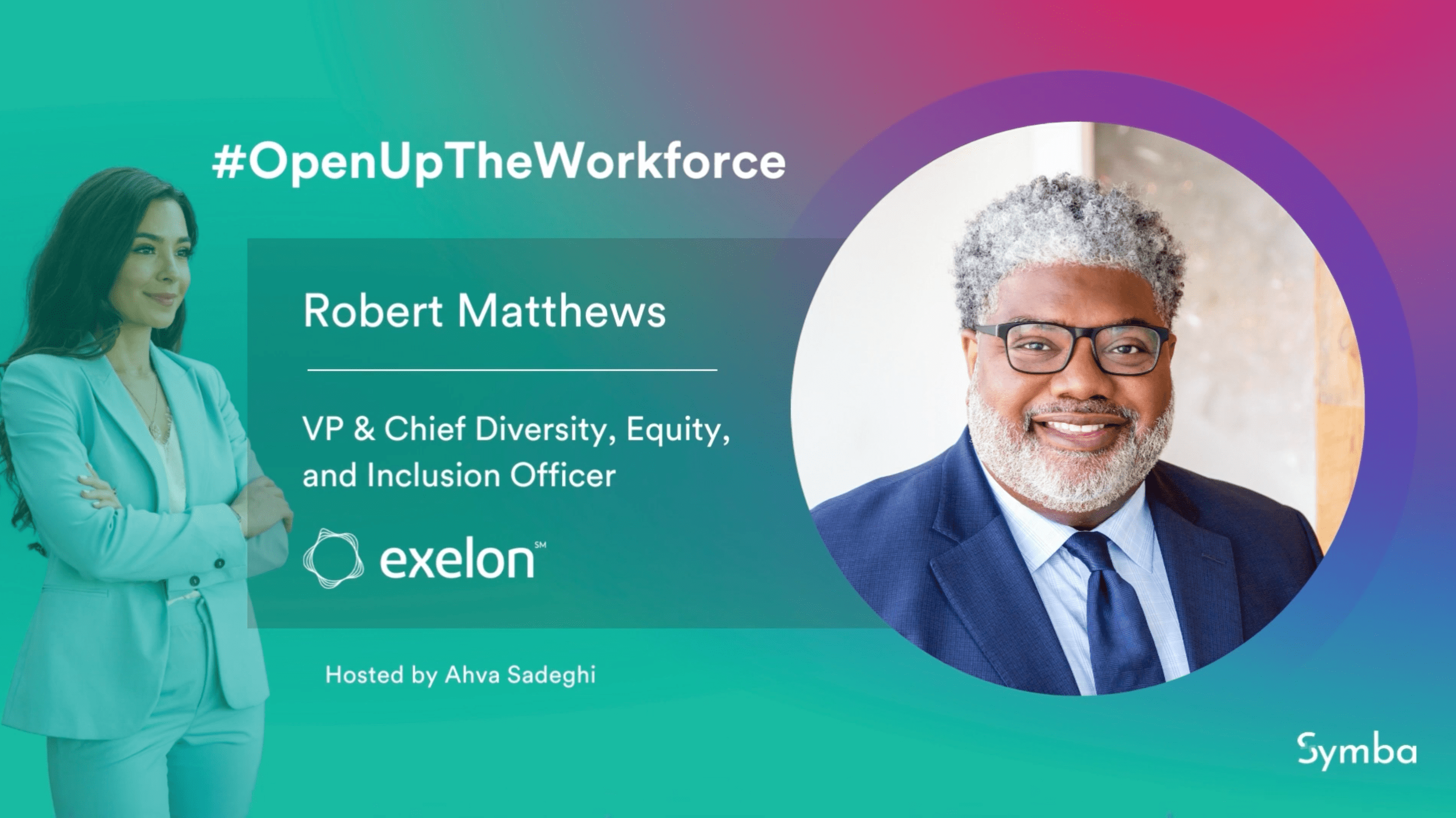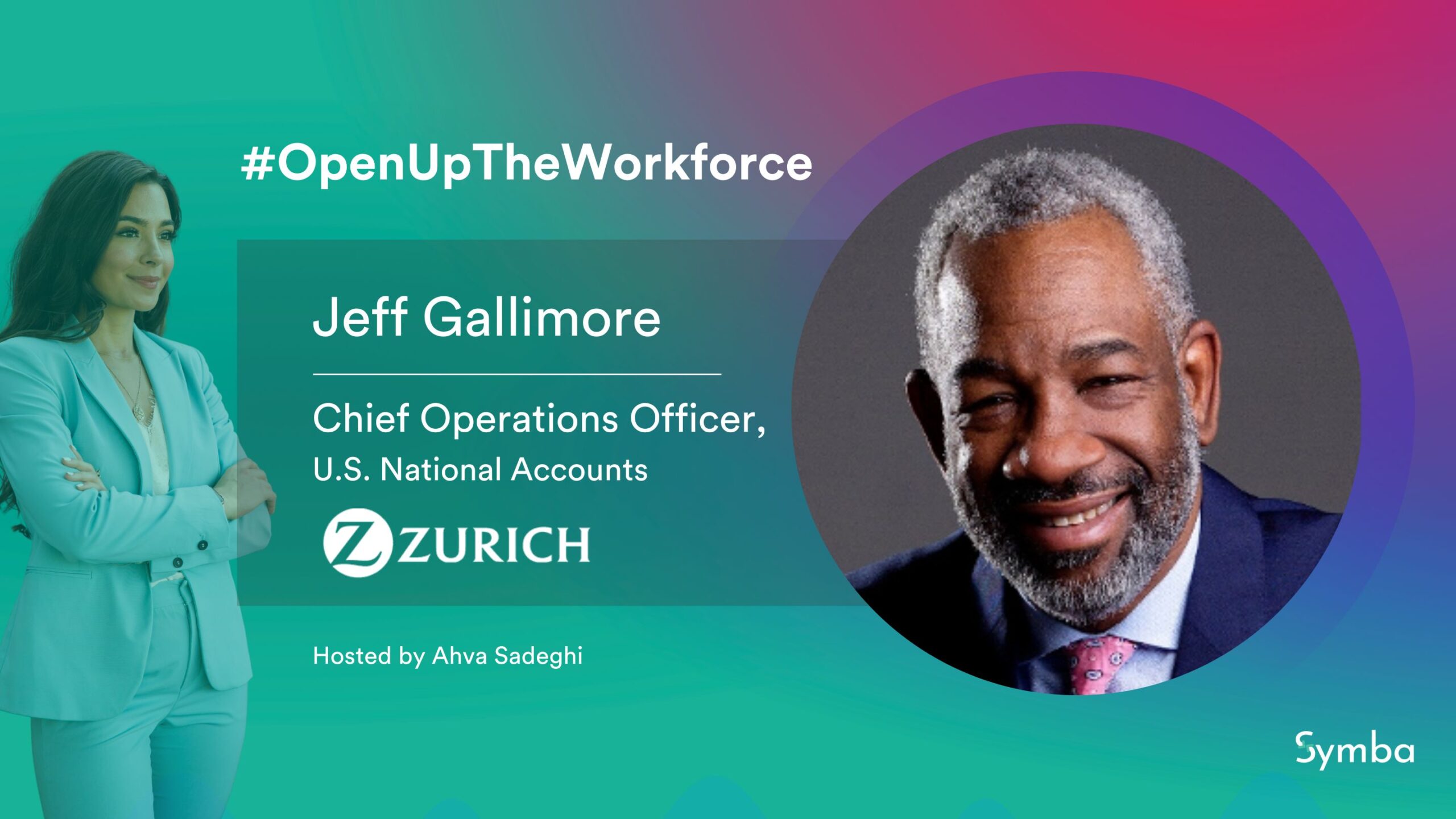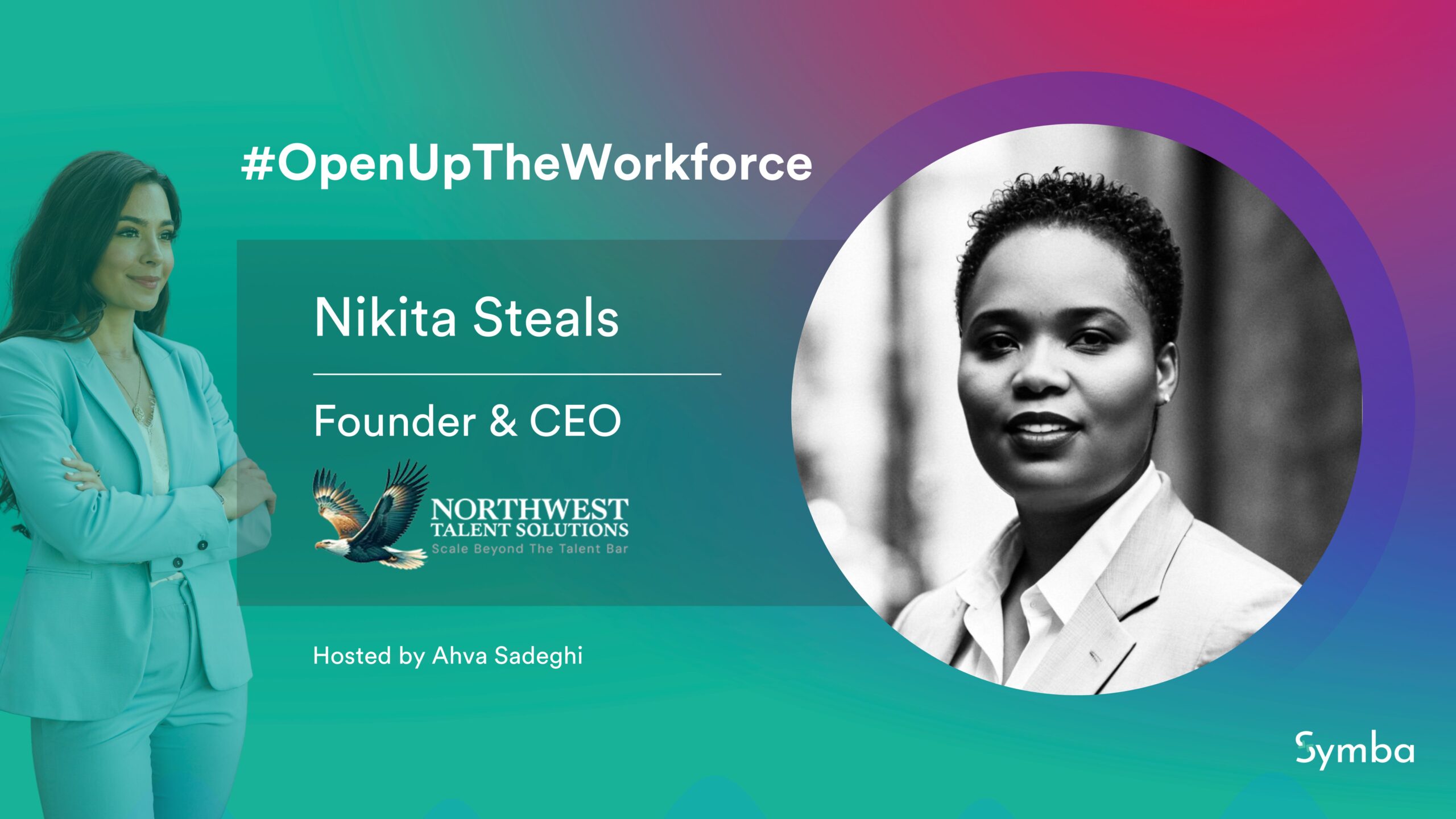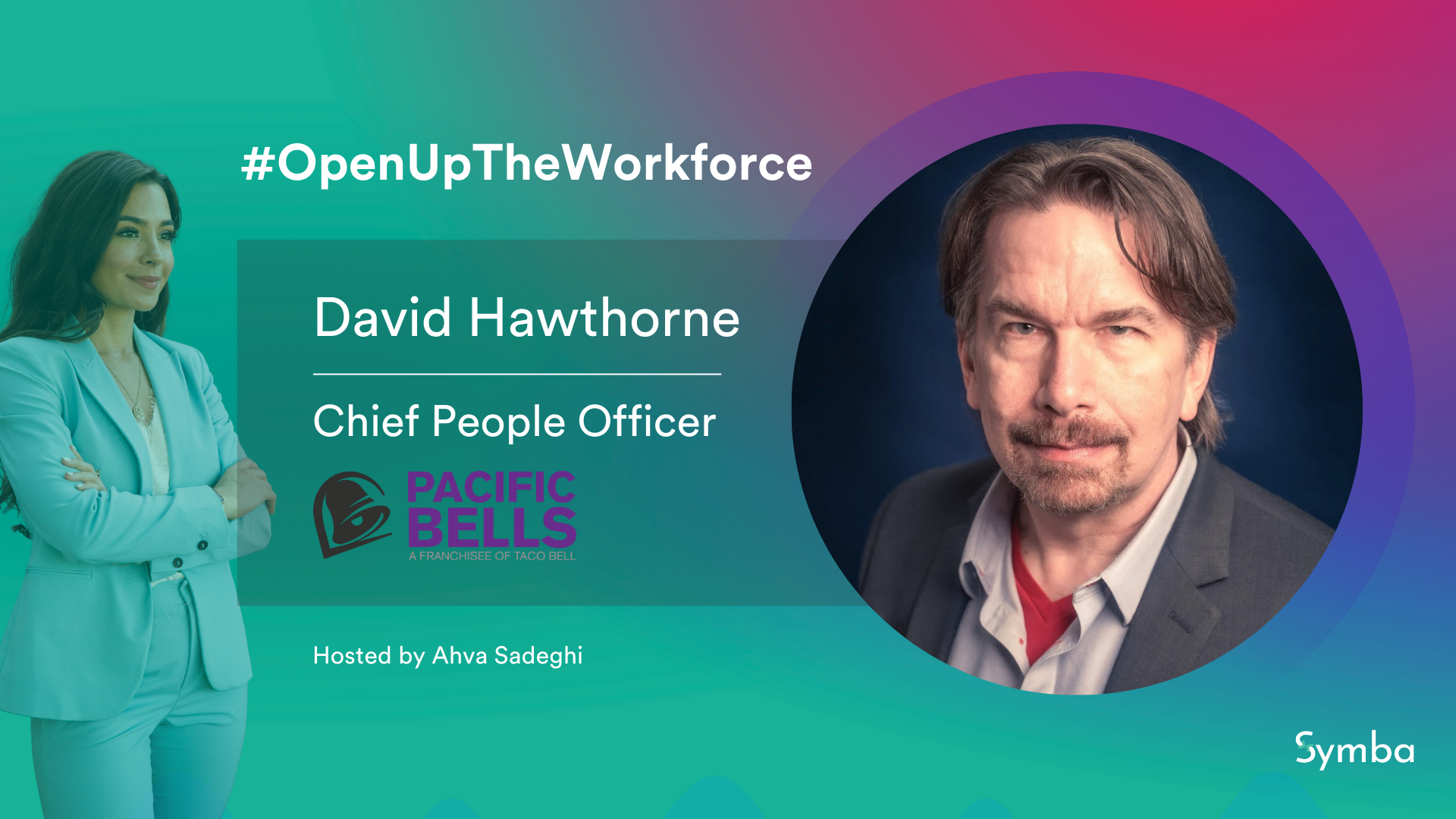Presented by Symba, #OpenUpTheWorkforce interviews feature executives advancing inclusion, diversity, and equity for the future of work. In these short audio-only episodes, host Ahva Sadeghi speaks with top leaders about what it takes to develop and implement inclusive processes.
In this episode of #OpenUpTheWorkforce, Ahva speaks to Robert Matthews, VP and Chief Diversity, Equity, and Inclusion Officer at Exelon. Robert opens up about his career journey, from interning at BLACK+DECKER and CareFirst to eventually joining Baltimore Gas and Electric, which was then acquired by Exelon. Robert speaks with nostalgia about the impact the INROADS program had on his career, and shares handy tips for setting up early career programs for success, including key metrics companies need to track. Also, find out what Exelon is doing to promote STEM careers and what leaders need to do to truly open up the workforce in the full episode here!
Robert’s Career Journey: From INROADS Student to Intern to C-Suite
Robert started his career with internship stints at BLACK+DECKER and CareFirst, where he landed his first full-time job. After gaining exposure to many areas of HR, Robert joined Baltimore Gas and Electric (BGE) over 18 years ago and held various positions in HR and talent management. He has since transitioned into BGE’s parent company Exelon and went from Chief of Staff to the CEO of Exelon Utilities to his current role as the Chief Diversity, Equity, and Inclusion Officer. Robert credits the INROADS program for shaping his early career. Introduced to INROADS while in high school, Robert learned various things, such as corporate etiquette, preparing resumes, and crafting an elevator pitch–nuggets that helped him navigate the corporate world and set him up for a successful career.
Early Career Programs at Baltimore Gas and Electric
In partnership with Baltimore city schools, BGE launched its early career program with 14 students in 2016. The program provides students studying specific trades with real-world exposure and connects them to pathways of employment within the company. According to Robert, workforce development including early career programs demands significant resources in time, effort, and financial investment. While securing funds can be relatively manageable, the core focus remains on ensuring these investments translate into a positive internship experience and sustainable careers for the students involved. At BGE, the program's success centered on familiarizing students with the inner workings of the company, encompassing both office and field work, building mentorship networks, and obtaining buy-in from company leaders. Recalling his struggle with long commutes during his own internship, Robert made transportation arrangements a central pillar of the program.
Key Metrics to Track for Early Career Programs
Various key metrics can be used to gauge the success of early career programs. At BGE, metrics tracked include the number of students enrolled, completion rates, and how many students successfully secure positions in their intended fields. In addition, BGE tracks pass rates on trade test entry exams to measure the effectiveness of the program’s preparatory efforts. BGE’s approach also extends beyond individual performance metrics and analyzes data to identify community needs, pinpointing specific schools that require attention. Here, the company measures success by its ability to address these needs and facilitate transitions into internships and subsequent employment opportunities. Robert also emphasizes the qualitative aspects, such as stories of individual students and showcasing the impact the programs have on the lives of those involved.
Giving Back to the Community
Exelon takes commitment to community impact seriously, actively addressing community issues by partnering with organizations and institutions to ensure their investments make a meaningful impact in the communities they serve. In 2022, for instance, Exelon contributed $48 million to 2,100 organizations spanning 19 states and the District of Columbia. Notably, $5.8 million was donated through the Exelon Foundation Giving campaign, resulting in $11.6 million directly benefiting the served communities thanks to corresponding matching gifts. Additionally, 6,300 employees dedicated 126,000 service hours through volunteering, redeeming half a million dollars in further donations to nonprofits and charities.
Exelon has also established programs like the Exelon Foundation STEM Academy, focusing on inspiring high school girls to explore energy and climate careers. Over 1,000 girls have participated in this program, which involves a week-long overnight camp at a university and year-long mentorship. Graduates from the STEM Academy have the chance to apply for a full college scholarship, covering tuition, room, and board for four years. Additionally, the foundation supports students studying key majors—engineering, IT, business, and finance—with a commitment to recruiting from these fields. There are similar programs in collaboration with the United Negro College Fund (UNCF) at Historically Black Colleges and Universities (HBCUs), offering $25,000 for four years to selected students.
What are the Next Steps Leaders Need to Take in Order to Truly Open up the Workforce?
To truly open up the workforce, Robert emphasizes the need to create an awareness of the existence of opportunities and actively address the barriers stemming from a lack of awareness. The next step, according to Robert, is ensuring meaningful access to historically underserved and under-resourced communities. Robert underscores the necessity of providing clear pathways to real opportunities, acknowledging and rectifying the historical lack of awareness as crucial steps towards achieving equity and meaningful progress within communities.
Final Word: On Leadership and Making Room for Others
Robert was washing his hands in the restroom at his church, and from the mirror, he could see a gentleman on crutches struggling to open the door, because the automatic door button was broken. Robert shares impactful leadership lessons he drew from this encounter.
Firstly, the mirror taught the lesson of taking responsibility and leveraging one's position and privilege to drive impact and address community issues. Secondly, the handle symbolized making room for others by actively ensuring inclusivity. This entails recognizing who is present in spaces and who isn't, and taking responsibility to create opportunities for those who might face barriers. Lastly, the button represents systemic issues. Although Robert helped the gentleman by opening the door, the underlying problem—the malfunctioning button—remained unreported and unsolved. While individual actions may solve immediate issues, addressing systemic flaws is essential for long-term impact.
By embodying these lessons—taking responsibility, making room for others, and addressing systemic issues—companies and individuals can affect meaningful change and prevent others from experiencing unnecessary difficulties or exclusion.
About Robert Matthews
Robert D. Matthews is the vice president, talent and chief diversity, equity, and inclusion officer. In this role, Robert is responsible for designing enterprise-wide strategies that facilitate a diverse and inclusive environment, supporting business objectives and positioning Exelon as a recognized leader in DEI. He is also responsible for Exelon’s talent management and organizational effectiveness functions. Robert serves as Chair for Edison Electric Institute’s DEI Executive Advisory Council, which serves as a forum for
working with members on emerging DEI issues and company best practices.
Robert previously served as vice president, workforce development and Exelon Utilities chief of staff in early March 2020. In that role, Robert was responsible for the advancement, oversight and strategic direction of Workforce Development (WFD) across Exelon and oversaw the operations of the utilities CEO’s office. Prior to his role at Exelon Utilities, Robert served as director, talent management and talent acquisition for BGE. In that role, he had oversight for the talent management, organizational development and talent acquisition functions and was responsible for creating and implementing a cohesive strategy to attract, acquire, develop and retain talent. He also drove BGE’s diversity and inclusion recruitment initiatives and was responsible for leading internal and external efforts to shape BGE as a leader in workforce development. Prior to joining BGE in 2005, Robert held leadership positions in human resources at print and digital solutions company Vertis, Inc., including manager of compensation and employee services. Robert spent his early career with CareFirst BlueCross BlueShield where he also worked in human resources roles.
Robert currently serves as vice chair of the Board of Directors at The Leadership, a civic leadership development organization established to improve the quality of life and economic vitality of Baltimore. He is also board chair of the Baltimore Bon Secours Foundation. Robert is very active in his local church where he serves in a leadership capacity.
Robert earned a bachelor’s degree in business, and graduate degrees in business and counseling. He is also credentialed as a Licensed Clinical Professional Counselor (LCPC).





